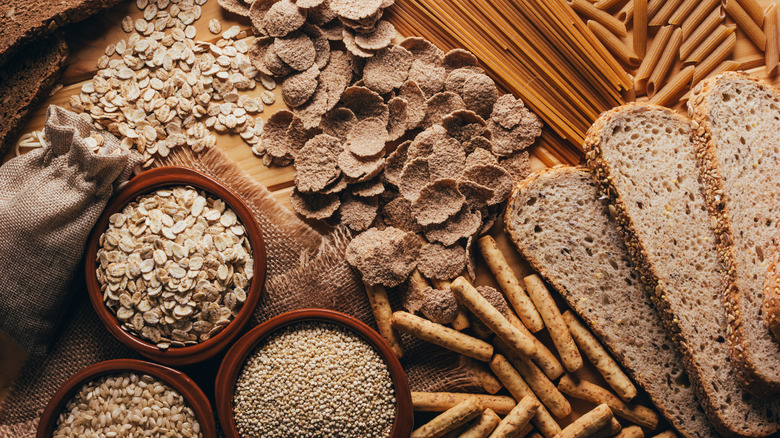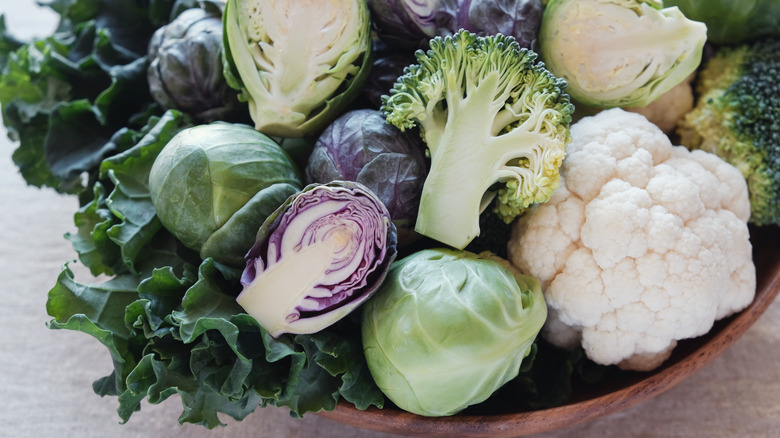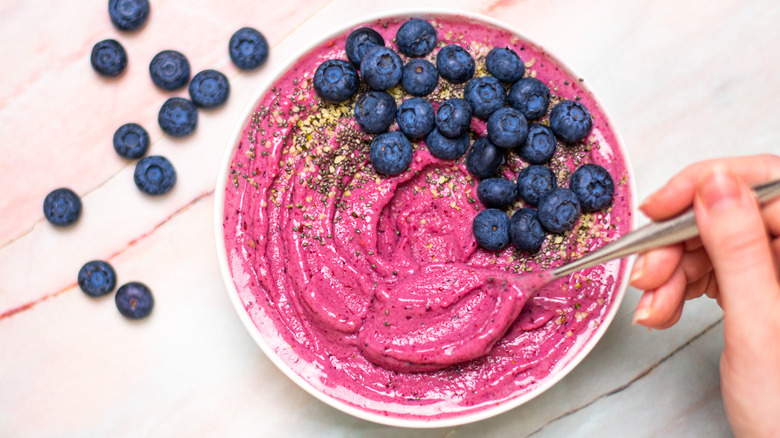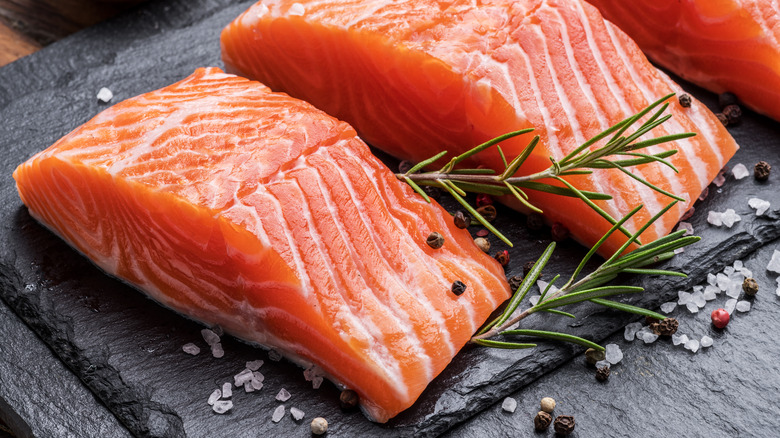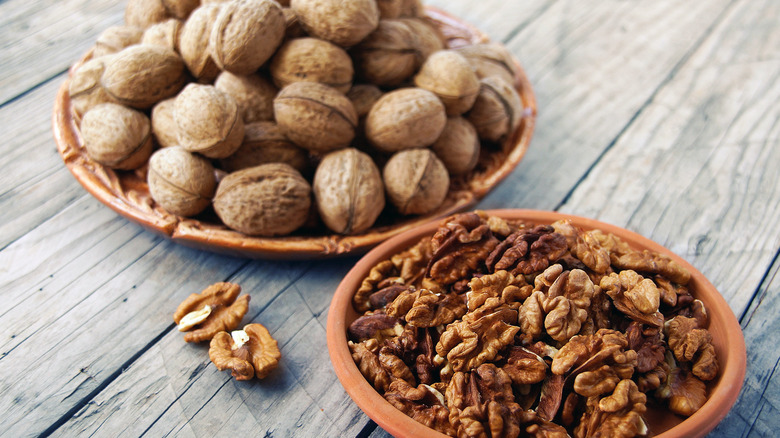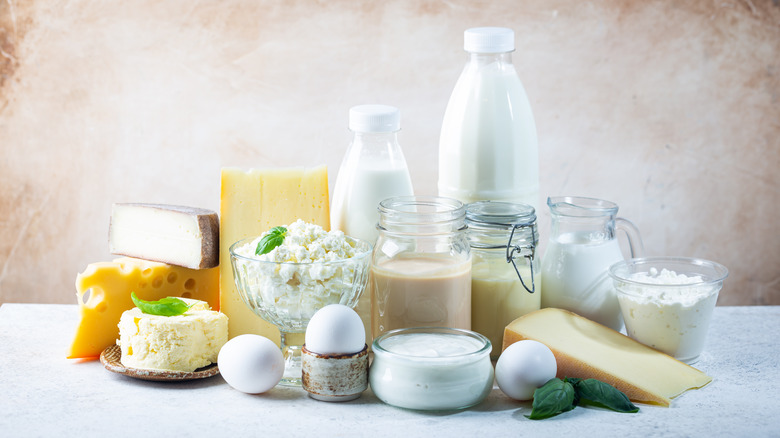7 Foods To Eat And 7 To Avoid For Brain Health
Here's some food for thought: Some foods help promote thought. Well, brain health, anyway. In fact, there's a lot of evidence that shows what you eat impacts your brain's health and your chances of developing age-related brain disorders like Alzheimer's disease. That's great news, since dementia statistics are not very encouraging. By 2050, the number of people with the disease is expected to more than double, according to the Alzheimer's Association.
Although there are drugs on the market approved to help manage Alzheimer's, according to the Mayo Clinic, it is wise to take care of your brain now and do everything you can to prevent dementia. Fortunately, the solution may be a lot easier than you think. What you eat — or don't eat — as it turns out, can be a strong predictor for your risk of developing dementia later in life, and it can even help your brain in the near term.
Eat: Whole grains
As a kid, you probably rolled your eyes whenever you found a sandwich made from whole wheat bread in your lunch box. But your mom was onto something. There are a lot of reasons to switch from processed white grains to whole grains, and it isn't just because a diet rich in whole grains may help prevent type 2 diabetes, heart disease, and certain cancers of the digestive system (via Alzheimer's Association). Whole grains may also be good for your brain.
A University of Minnesota review found that grains in general provide energy-hungry brains with an important source of glucose. Contrary to what you might have heard from the Atkins people, carbohydrates actually do have health benefits. They are good for your brain because they contain antioxidants and other compounds that help keep inflammation in check. That's important, since inflammation can cause damage to your brain over time, and that can lead to age-related brain disorders and neurological diseases. Whole grains in particular are especially good for you because they don't give your brain a big sugar rush like refined grains do, and they contain a lot more fiber and brain healthy nutrients than their refined counterparts.
Avoid: Processed meats
For every thing you should be eating, there are usually plenty of equal and opposite things you should not be eating. You may not be super surprised to hear that processed meat is one of them. If you're concerned about your brain, it's officially time to give up your lunchmeat and sausage habit. Sorry about that.
According to 2020 research published in the Journal of Family Medicine and Primary Care, cured meats contain N-nitroso compounds, which are associated with a higher risk of developing brain tumors. To be fair, you might be able to eat some cured meats if you make sure to also eat fruits, vegetables, and foods rich in vitamin A, which could have a balancing effect on your cured meat consumption. But alas, eating a lot of processed meat is potentially associated with an increased risk of dementia, according to a study published in The American Journal of Clinical Nutrition. So like everything in life, moderation is a good idea.
Eat: Leafy greens and cruciferous vegetables
Time to call up Mom and apologize for all the years of refusing to eat your "yucky" vegetables. As it turns out, she was right to push these veggies onto your plate. (Also, vegetables aren't yucky at all if you learn how to prepare them!)
In the lab, raw, leafy greens have been shown to reduce neurodegeneration in aging rats. A 2005 study in Experimental Neurology found that rats that ate spinach had fewer obstructions of blood supply in their brains. And cruciferous vegetables like broccoli, cauliflower, brussels sprouts, and cabbage are brain-healthy, too. The Journal of Functional Foods reports that a diet high in cruciferous vegetables may help reduce oxidative stress, which is what happens when the balance between free radicals and antioxidants gets out of whack. Oxidative stress can destroy the nutrients and other chemicals your brain needs for healthy functioning, and it can even cause physical damage to nerve cells. Over time, this kind of havoc can lead to Alzheimer's disease.
Additionally, a 2018 study published in Molecules found that the isothiocyanates in cruciferous vegetables can help prevent the growth of cancer cells in the brain and elsewhere, so Alzheimer's prevention isn't even the only reason you should eat your vegetables.
Avoid: Sugar
As the years go by and science collects more information, some foods fall in and out of favor with dietitians. But one food that's remained pretty steadily in the unhealthy column is sugar, much to the dismay of sweet-loving American palettes.
A 2018 study in Metabolic Brain Disease found that after only a few months on a high sucrose diet, mice developed an early-stage brain disease similar to Alzheimer's. Researchers described "spatial memory deficits" and "increased despair" in their subjects, so even if that doesn't make you feel kind of bad for the poor mice it should at least make you side-eye that innocent-looking slice of chocolate cake.
Research published in Current Opinion in Clinical Nutrition and Metabolic Care noted the connection between type 2 diabetes and Alzheimer's disease. Insulin resistance is associated with high-sugar diets, which is one of the features of both Alzheimer's disease and type 2 diabetes, so reducing the amount of sugar in your diet isn't just something you should be doing for your brain but also for the rest of your body.
Eat: Berries
Some adults never grow out of vegetable-hating, and if that's you, never fear. You can also eat berries to help ward off diseases of the aging brain. Blueberries in particular have been noted for their ability to fight oxidative stress and inflammation. The authors of a 2012 study even suggested that a diet high in blueberries may be able to reverse neuronal aging, just in case you want to put off eating healthier until the very last minute, though you're not going to find many doctors who recommend that strategy.
Blueberries contain polyphenolic compounds that function as antioxidants, which means they can help combat those free radicals that are messing things up in your brain. The same 2005 research that studied the brain health of rats who ate spinach also found that blueberries had similar benefits, including fewer obstructions of blood supply in their brains.
If you're not into blueberries, don't worry, there are other brain-smart berry options. Strawberries may also help slow cognitive decline, and raspberries have similar properties.
Avoid: Alcohol in excess
Most of us understand that there's a negative relationship between chronic alcohol abuse and your health. People who abuse alcohol may develop a host of both short-term and long-term health problems including liver disease, certain cancers, high blood pressure, miscarriage and fetal alcohol spectrum disorders, alcohol poisoning, and stroke, according to the CDC. And alcohol abuse has been associated with other chronic problems like poor mental health, social conflict, violence, and an increased risk of fatal accidents.
There is also a growing body of research that links overconsumption of alcohol to brain damage. One study in Molecular Neurobiology even linked ethanol — the type of alcohol produced by fermentation that's found in alcoholic beverages — to an increase in neuritic plaques in the brains of laboratory mice.
It's worth noting that some studies have also found that moderate use of some alcohol like red wine may have a protective effect, though the ingredient most associated with this effect is resveratrol, which is also found in unfermented grapes. So you don't need to drink red wine to get the protective effect, though it's arguably more exciting than just eating grapes. Just remember: Everything in moderation.
Eat: Seafood or olive oil
Fat was the villain for many years, but we're finally starting to realize that it's really more of an anti-hero. Certain fats are proving to be the opposite of what many thought they were. Not all fat clogs arteries and causes weight gain. Some fats, like those found in certain kinds of seafood (think: salmon), are actually good for your heart and, as it turns out, for your brain, too.
Fatty acids are the building blocks of fats, and omega-3 fatty acids are some of the most healthy. They're important for building cell membranes, and your body and brain also use them for energy. The omega-3 DHA, for example, is especially important for brain and eye health, according to the National Institutes of Health's Office of Dietary Supplements.
One study published in the American Journal of Preventive Medicine even suggests that eating omega-3-rich fish weekly might reduce "age-related brain gray matter loss." Not everyone loves fish though, right? The good news is you can also get omega-3s from plant-based sources like olive oil. A study published in JAMA Internal Medicine found that people who consumed seemed to have slower cognitive decline than those who didn't use olive oil.
Avoid: Certain types of fish
While it's generally agreed that fish that contain a lot of omega-3 fatty acids are good for you, that comes along with a caveat that there are some kinds of fish you should avoid for the sake of your brain. For years, pregnant women have been told to avoid top-of-the-food-chain fish like tuna, swordfish, and king mackerel because large, long-lived fish accumulate a lot of mercury over time, and mercury may damage a fetus's developing brain, as detailed in a study published by Yonsei Medical Journal. But more recent research also shows that people who aren't pregnant may be risking their health if they eat a lot of high-mercury fish (via Today's Practitioner). These particular seafood choices are associated with a decrease in cognitive function.
This doesn't mean that the fish themselves are bad for you. In fact, in the absence of mercury contamination, a swordfish steak would be just as healthy as a salmon steak. The study noted that even high-mercury fish contain the omega-3 fatty acids that are associated with brain health, but that their effects are canceled out in the presence of high levels of mercury.
Eat: Walnuts
Not everything that has to do with the health of your brain is about preventing Alzheimer's and other forms of dementia, although keeping your brain healthy in the short term is certainly going to impact your well-being later in life, especially if you're lucky enough to live to your 70s, 80s, or beyond. Still, there have probably been plenty of times in your life when you wished you had a little more cognitive power to draw upon in the moment.
Well, good news: A 2011 study published in the Cambridge University Press found that a diet that includes walnuts may improve the "inferential verbal reasoning" skills of even healthy, young adults. Other studies have found an association between walnuts and improved working memory in elderly patients, so adding these nuts to your diet now and in the future might be a good idea.
If you're not super keen on walnuts, never fear. A study in the Indian Journal of Pharmacology found that almonds might also have the ability to reverse cognitive impairment, and other less-studied nuts are likely to have similar benefits.
Avoid: Refined carbs
You can add just about anything to your diet as long as you don't add too much of it, but Americans, in particular, do love their white bread, white rice, and white pasta. And the refined carbohydrates that these foods contain are increasingly associated with a myriad of health problems, from diabetes to dementia.
The real problem with these sorts of processed foods is that they tend to have a higher glycemic index than unprocessed foods, which means they can cause a rapid rise in blood sugar (via MedicineNet). More importantly, refined carbohydrates have a high glycemic load, which is a measure of how much glucose there is in a food versus how quickly it gets into your bloodstream, explained Harvard Health. A 2020 study published by the Alzheimer's Association found that eating a lot of refined carbohydrates was strongly associated with an increased risk of dementia in elderly people.
The good news is you don't have to give up your pasta habit or leave the rice out of your Chinese take-out order. There are plenty of alternatives to refined pasta and white rice — whole-grain bread, brown rice, and whole-grain pasta are all healthy alternatives to the refined carbohydrates you eat every day.
Eat: Dairy
Dairy is another one of those foods that has suffered from years of bad press, especially full=fat dairy, which contains a lot of saturated fat. Since eating too much saturated fat can contribute to an increase in cholesterol, "full-fat dairy is bad" was kind of a natural conclusion. But a 2018 study found that full-fat dairy actually has a lot of health benefits. Plus, it doesn't seem to contribute to an increased risk of cardiovascular disease. So that's good news, but what about brain health?
Well, according to 2014 research published in the American Journal of Clinical Nutrition, older adults who consume a lot of milk and cheese had higher cerebral concentrations of glutathione, an important antioxidant. Patients suffering from neurodegeneration have a notable absence of glutathione in their brain tissue, so dairy could just help. If you're still a bit iffy on drinking full-fat milk, that's okay too. There's plenty of evidence that low-fat dairy has cognitive benefits, too.
Avoid: Fried foods
Everyone loves a nice burger, and even if your burger of choice is made of black beans or plant-based meat, you probably enjoy it with a side of deep-fried potatoes. Thankfully, trans fats have been banned in the United States; however, deep-fried foods are still associated with health risks, especially cardiovascular disease, according to Harvard Health. And they can have a negative effect on your brain's health, too.
It's true that researchers have found a strong link between trans fats and Alzheimer's disease (via CNN). Still, other research, like one study published in Food Science & Nutrition, demonstrates that fried foods can contain unhealthy compounds like acrolein, which forms in hot cooking oil and is often found in deep-fried fast foods. Acrolein has an association with Alzheimer's disease as well as a bunch of other diseases you really don't want to develop, like heart disease, diabetes, and stroke. All of which are really great reasons why you ought to just go ahead and ditch the deep fryer in favor of that air fryer you've been wanting.
Drink: Coffee
Okay, so this one isn't a "food," per se, but it deserves attention. After years of not really being taken seriously, coffee is finally getting some good press. Recent research has confirmed that coffee consumption isn't just a way for you to feel alert at ungodly hours or stop snapping at your coworkers for no good reason, but it can also ward off Alzheimer's disease and may also decrease the risk of developing depression, stroke, and Parkinson's disease.
According to a 2011 study published in Missouri Medicine, coffee is full of antioxidants and is associated with a bunch of different health benefits as highlighted above, plus a reduced risk of type 2 diabetes and "death from any cause," which is a pretty strong recommendation for the stuff all by itself. Specifically, though, drinking three to five cups of coffee during the middle part of your life is associated with an up to 65% decrease in your risk of developing dementia or Alzheimer's disease. So hey, there's a reason to go to Starbucks more often (because that's exactly what your budget needs right now, right?).
Avoid: Tofu
Tofu has long been touted as a great meat substitute, despite it not really tasting anything like any kind of meat, and not really having a meat-like texture, either. Still, it shows up in a lot of vegan recipes, mostly because it's got a lot of protein, which can be hard to incorporate into a vegan diet.
Unfortunately for tofu lovers, though, there are a few studies that link over-consumption of this soy-based product with cognitive decline late in life. According to a Karger study, elderly Indonesian subjects who ate a lot of tofu scored poorly on a memory test. Interestingly, the same effect was not noted with subjects who ate a lot of tempe (another soy-based food). Researchers hypothesized that tempe, which is fermented, contains a lot of folates, which may help balance the potentially harmful effects of phytoestrogens, which are present in both tempe and tofu and may be associated with an increased risk of dementia.


